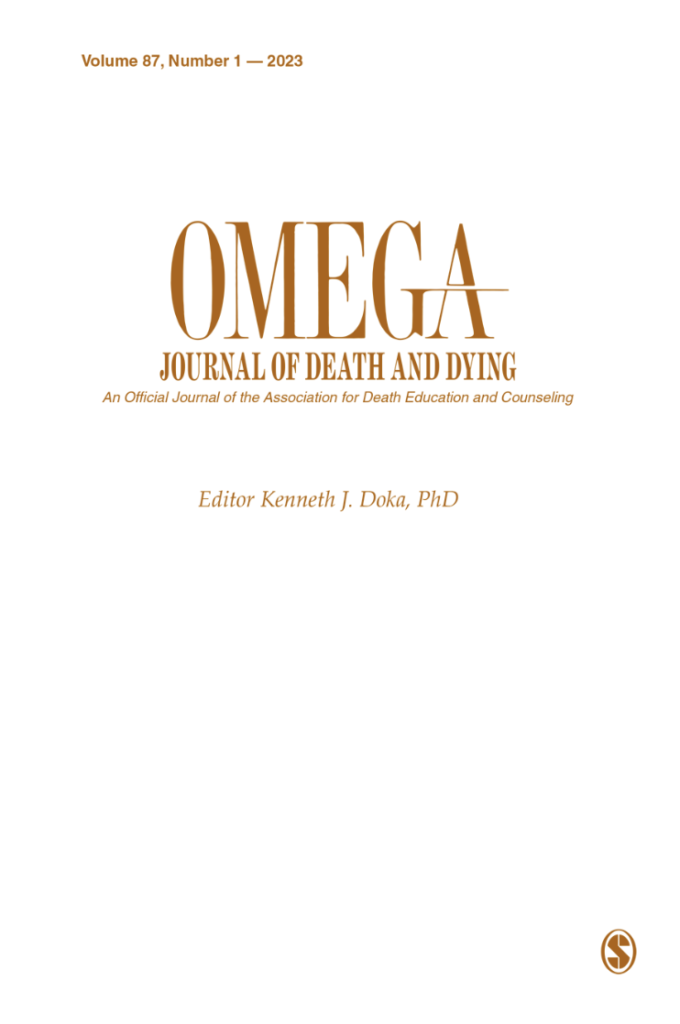Home > Doula Research: Why Your Voice Is So Important
Doula Research: Why Your Voice Is So Important
by Loren Talbot and Amber Thompson
While awareness about end-of-life doulas has been growing around the United States and some other areas of the world, there is still much research needed to help solidify the role of doulas in the continuum of care. Although many of us know how valuable this support is for the dying and their families, substantiating this work through research and peer-reviewed studies will further establish doula roles at end of life.
Over recent months, we have been reaching out to the INELDA community with requests from researchers. This research broadens the knowledge base and supports the work that we do in academia, in the medical field, with mental health professionals, and more. It expands information for those who are seeking to effect change in a systemwide approach and problem-solve ways to address gaps in the delivery of care.
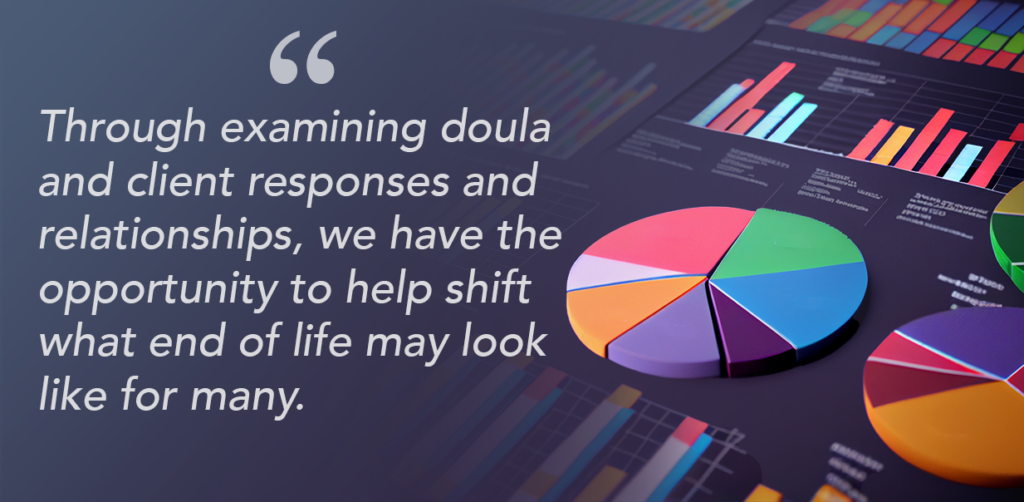

While awareness about end-of-life doulas has been growing around the United States and some other areas of the world, there is still much research needed to help solidify the role of doulas in the continuum of care. Although many of us know how valuable this support is for the dying and their families, substantiating this work through research and peer-reviewed studies will further establish doula roles at end of life.
Over recent months, we have been reaching out to the INELDA community with requests from researchers. This research broadens the knowledge base and supports the work that we do in academia, in the medical field, with mental health professionals, and more. It expands information for those who are seeking to effect change in a systemwide approach and problem-solve ways to address gaps in the delivery of care.
How Research Helps
By participating in research studies, the field as a whole becomes more credible. With multiple disciplines examining the roles of end-of-life doulas, we further cement the importance of our support to a larger audience. Through exploring the field, research is able to qualitatively and quantitatively measure the EOL doula impact on individuals and communities.
This leads to identifying problems and opportunities, and helps to create new ideas on how to deliver care. With feedback and insight from working doulas, researchers are able to look at delivery care models that can be integrated into a larger public health approach to end-of-life care. By examining the ways in which an end-of-life doula may address the spiritual, emotional, and practical care needs of the dying, those conducting studies can make correlations for a more comprehensive care delivery model.
Research directly helps reach people. While this work has been done informally for as long as civilizations have existed, there are many people unaware of the role of the end-of-life doula. Research and the publication of studies brings attention to the field and expands access to those just learning about doula support. It also allows researchers and participants to gain a deeper understanding of people and why they do the things they do. The examination of individuals at end of life is often a challenge, and doulas can serve an intermediary role by sharing some of their experiences. Through examining doula and client responses and relationships, we have the opportunity to help shift what end of life may look like for many.
Why Participating Matters
Expanding public awareness is predicated on involvement by end-of-life doulas. The greater doula involvement in studies, the more support we create for this role in different communities. While sometimes study questions may seem repetitive or like another you already answered, they are creating a baseline of understanding for those new to the work and also those who are studying it.
Having published research allows doulas to find out more information about ourselves as a collective. Good research will include the opportunity to be informed about results and allow each of us to educate others about the role of doulas on a larger scale. This can be used when we educate our clients, care facilities, and our communities. It even plays a role in how we advocate for doula support from a systemic perspective. The doula community as a whole benefits from your involvement, as together we can influence the development of policy, practice, or service provision, shape legislation, and even alter behavior and attitudes in health care.
Participants are the most valuable component of any research. Specifically for social, behavioral, and medical sciences, they are necessary in order to gain answers to important questions. The spaces that doulas enter are understudied and often hard to access for many researchers. We can serve as a bridge between the dying, their loved ones, and the research community.
How Your Voice Has Already Impacted Research
Research on doulas providing end-of-life support is growing! This work cannot be done without your voice. Researchers can find out only what you are willing to share. While there are too many research articles to share in full here, there are some notable works that we want to mention as examples of what the world is learning about EOLDs.
Research is important in finding out about who populations “are.” Some studies, such as “New Faces at the Bedside: Death Doulas, Vigilers, and Companions,” [Read Abstract] help us to understand basic demographics and backgrounds of unique populations. Studies like “The voices of death doulas about their role in end of life care” help inform others about how and why death doulas have emerged in the modern context. Additionally, this work helps to identify barriers and challenges currently faced by EOLDs. Along the same lines, research such as “We are Human too”: The Challenges of Being an End-of-Life Doula” [Read Abstract] can help you gain insights and understanding about the struggles EOLDs may be facing. This information may help you and your doula community support one another and recognize what you may need to tune into.
Sometimes, research may come in the form of interviews or surveys that find their way into public media, such as The New York Times piece “Death Doulas’ Provide Aid at the End of Life.” Another widely disseminated piece, also from the Times, is “The Positive Death Movement Comes to Life.” While this piece is not solely concerned with EOLDs, it does connect doula work with the death reform efforts of death positivity. These types of work often influence public opinion and may influence how and why individuals perceive the need for EOLD support.
Researchers are bound by the information they can receive. Research also builds on other research. One example of research building on others is Amber Thompson’s dissertation, which focuses on the value(s) of doulas for end-of-life. Expanding beyond demographics, tasks, and services, this work seeks to better understand what doulas seek to provide at end of life and where they hope to see this role go in the future.
While this work is ongoing, a few descriptive findings have come from the first phase of the project, which surveyed a pool of 224 end-of-life doulas based in the United States.
Anyone interested in learning more information from this first phase should feel free to contact Amber. Please see the end of this article for additional research opportunities.
While this list is not all-inclusive, it does give some insights into what you as the EOLD community focus on during EOL. Other things you may do, or want to do, included: teach and mentor other doulas, Death Cafes, home funerals, living funerals, organizing/downsizing and decluttering before death, and grief and bereavement support.
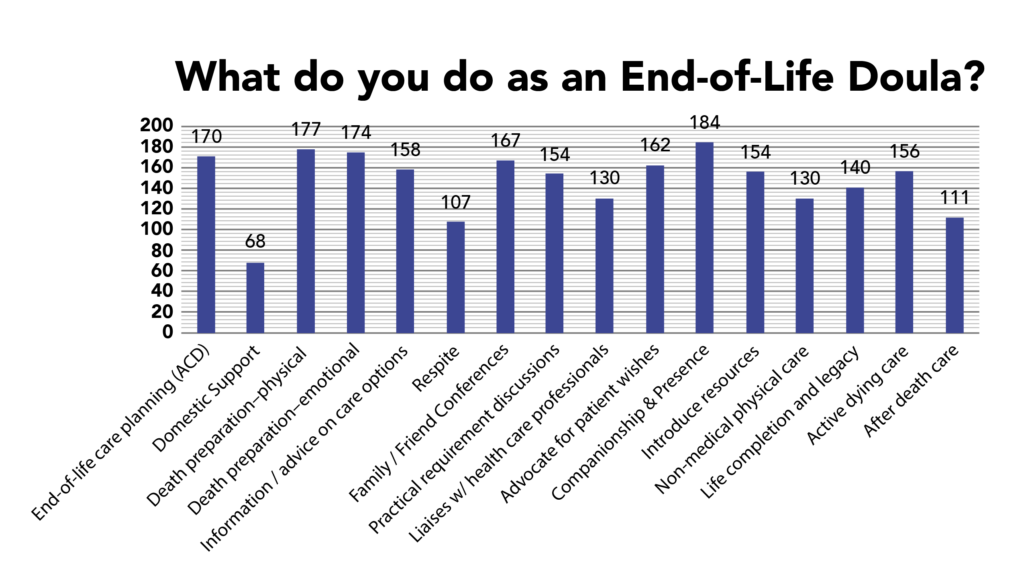
This figure describes the death reform movements which were presented in the survey (except medical aid in dying, which was a frequent “other” write-in). Feedback from this survey indicates that wording matters, such as highlighting the nuisance that death wellness, death literacy, or death awareness can impart, rather than death positivity. An additional point of note is the feedback that social justice in death is an important consideration which may not be fully represented in many of these reform movements. Identification with current death reform movements may be limited for oppressed and minority populations.
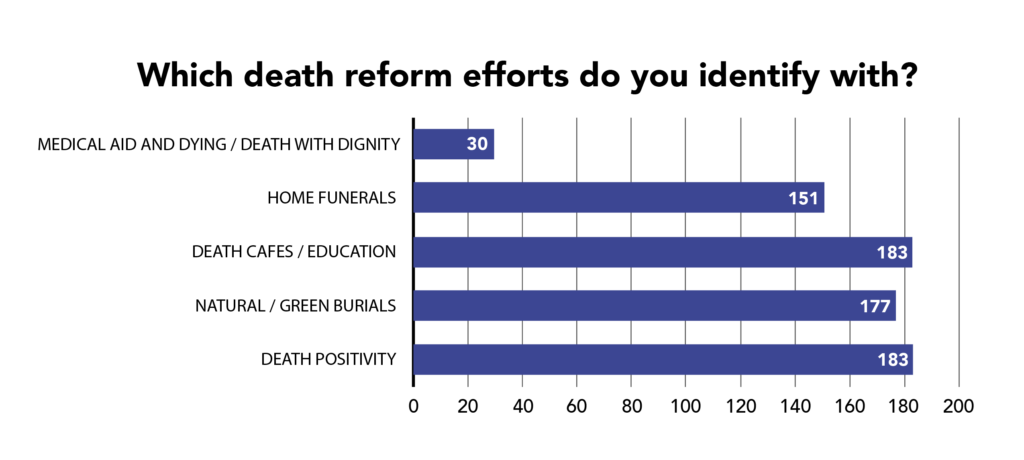
There are many different “types” of EOLDs, and this diversity is expressed in what you hope to see for the future of the EOLD as a role. There are some notable areas where doulas, as a community, agree.


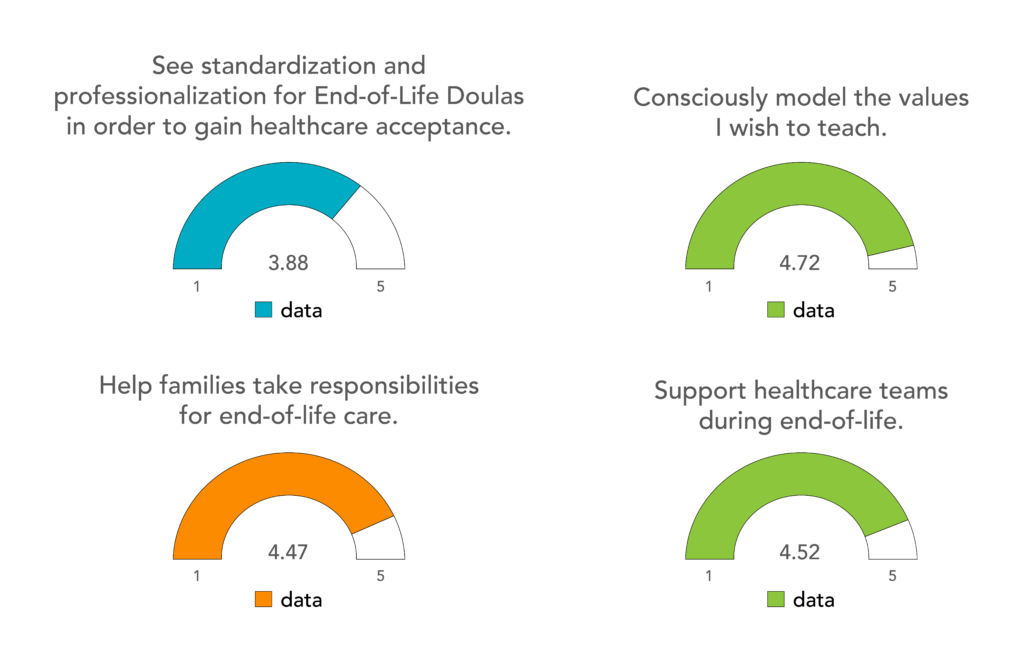
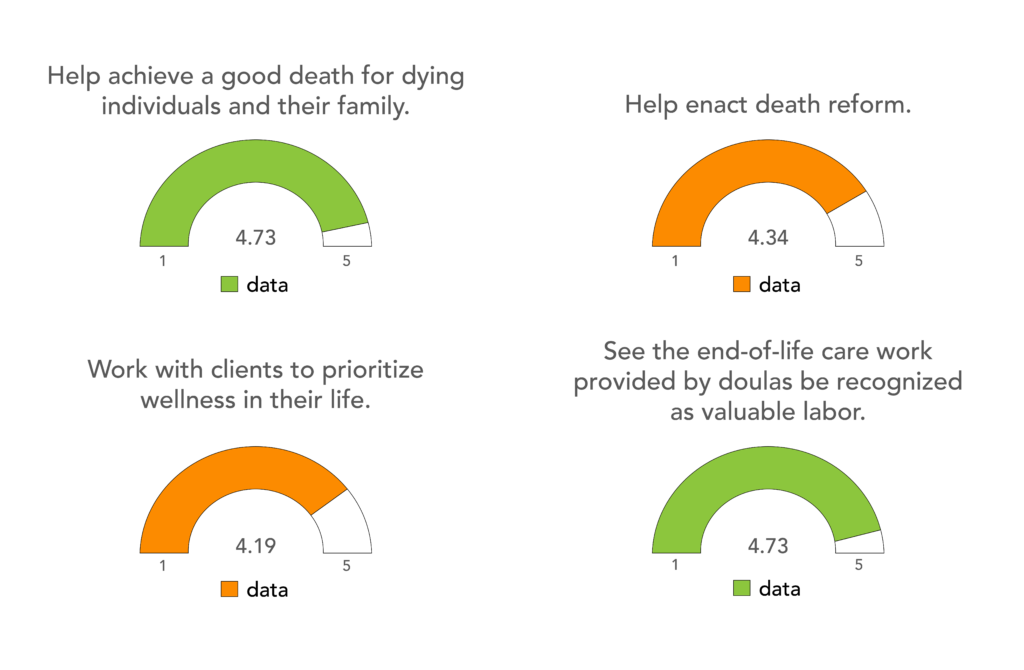
Future direction you hope to see for EOLDs (green):
- Empowering others to learn the human skill of “being with death and dying” (4.71 out of 5)
- Encourage physical and mental health at end-of-life (4.51 out of 5)
- Start conversations about death and dying to inspire change in society (4.79 out of 5)
- Consciously model the values I wish to teach (4.72 out of 5)
- Support healthcare teams during end-of-life (4.52 out of 5)
- Help achieve a good death for dying individuals and their family (4.73 out of 5)
- See the end-of-life care work provided by doulas be recognized as valuable labor (4.73 out of 5)
Future directions you may not see as important (blue):
- Earning a living/full-time career as an EOLD (3.6 out of 5)
- See standardization and professionalization for EOLDs in order to gain health care acceptance. (3.88 out of 5)
Future direction you may see as moderately important (orange):
- Help families take responsibility for end-of-life care (4.47 out of 5)
- Help enact death reform (4.34 out of 5)
- Work with clients to help prioritize wellness in their life (4.19 out of 5)
KEY
- Future direction you hope to see for EOLDs (green)
- Future directions you may not see as important (blue)
- Future direction you may see as moderately important (orange)
KEY
- Future direction you hope to see for EOLDs (green)
- Future directions you may not see as important (blue)
- Future direction you may see as moderately important (orange)
Please rate how much you agree/disagree with the following statement:
“As an End-of-Life Doula, I hope to…”



University of Utah: Family Interviews Researcher: Amber Thompson, MA, PhD (ABD)
This dissertation focuses on the value(s) of doulas for end of life, and the researcher (and co-author of this piece) is looking to connect with families who have used/received EOLD support during the death of a loved one. If it is safe and appropriate, and you know of an individual who has utilized EOLD support and may be willing to share that experience in an interview, please share Amber’s contact information with them! This study has been approved by the Institutional Review Board at University of Utah. Interviews will occur over the phone or on Zoom and take approximately one to one and a half hours (split between two sessions). Participants will be compensated with up to $50 in Amazon gift cards. Please contact Amber through email at [email protected] or through DM on Facebook @Amber Thompson: University of Utah Research.
University of California, Davis: End-of-Life Doula Survey Researcher: Dr. Madeleine Crilly, MD, MPH
You are being invited to join a research study. If you agree to be in this research, you will be asked to complete a survey. You will be asked questions about your experiences as an end-of-life doula. It will take about 10 minutes to complete the survey. There is no direct benefit to you from taking part in this study. We hope that the research will help elucidate the roles of end-of-life doulas in contemporary end-of-life care. The risks of this research are minimal. Some of the questions might make you feel uncomfortable or upset. You do not have to answer any of the questions you do not want to answer.
Jacksonville State University Researcher: Sociologist Sarah Donley
I am currently looking for research participants who work in the field of deathcare who would be willing to be interviewed and share their experiences. This study has been approved by the Institutional Review Board at Jacksonville State University. Interviews will occur over the phone or on Zoom and take approximately one to one and a half hours. Participants will be compensated with a $10 Amazon gift card.
The National Hospice and Palliative Care Organization
The National Hospice and Palliative Care Organization (NHPCO) established an End-of-Life Doula Advisory Council in 2018. An end-of-life doula is a nonmedical support person who provides a range of holistic services before, during, and after death to support people’s physical, social, emotional, spiritual, and practical needs. The purpose of this survey is to learn about the current state of collaboration between hospice agencies and end-of-life doulas.

